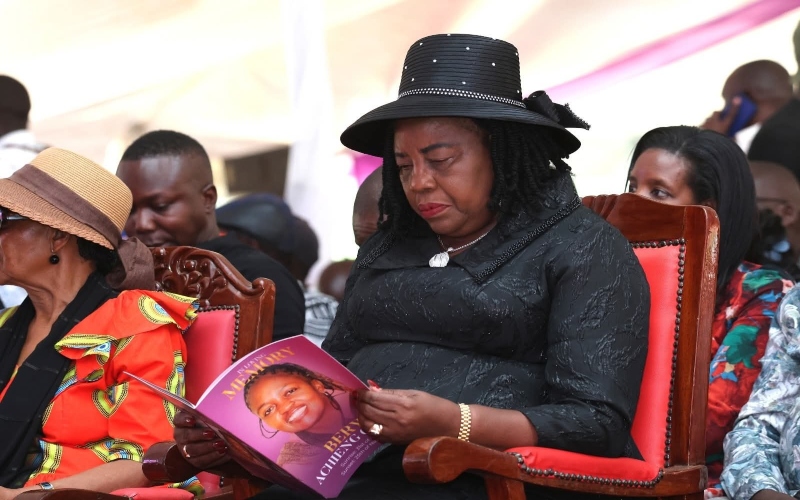State's silence on toxic waste dumping sparks outrage, leaders demand action

There are calls for a thorough investigation into the matter and for the government to take action to address the devastating consequences following allegations of toxic nuclear waste dumping in the region.
The government's silence on the allegations of toxic nuclear waste dumping in Northern Kenya has sparked outrage among Kenyans, with many demanding accountability and action.
Former Minister Cyrus Jirongo's revelations over the weekend have sparked a national conversation about the government's responsibility to protect its citizens and the environment. Jirongo alleged that former President Daniel Moi's regime knowingly dumped toxic nuclear waste in northern Kenya, leading to a high prevalence of cancer cases in the region.
More To Read
- Government unveils national action plan to boost hazardous threat response
- LSK condemns violence in by-elections, warns of gaps ahead of 2027 polls
- IG Douglas Kanja urges court not to issue orders over political activity claims
- Study shows women under 50 face higher risk of colon growths from ultra-processed foods
- MPs grill KenGen boss over hiring breaches, Sh5.3 billion asset transfer
- Study reveals why colorectal cancer resists immunotherapy
Farah Maalim, the former MP for Lagdera, has also revealed that he raised concerns about the government's use of land in the Northern region for oil exploration and dumping of industrial and nuclear waste in 1993.
"Mr Speaker, Sir, in view of the answer that has been given by the Minister and considering the history of that region's administration of Independent Kenya, is he going to deny or accept the fact that the Kenya Government is not interested in the people of the Northern region other than using their land for oil exploration and dumping of industrial and nuclear waste?" he said.
"Time has lifted the lid on treasonable rot. We shall get to the bottom of this grand betrayal of our country and the people of the North," Farah tweeted.
I made this serious observation on 10th Nov. 1993. The Moi Government of the day rejected my assertion vociferously. Time has lifted the lid on the treasonable rot. We shall get to the bottom of this grand betrayal of our Country & the people of the North. pic.twitter.com/rcvQv044LN
— Farah Maalim EGH (@FarahMaalimM) April 9, 2024
In a previous post on X, the now MP for Dadaab Farah expressed his long-held suspicions of toxic waste dumping in parts of Kenya, specifically in Lagdera, Wajir, and Marsabit. The alleged incidents are said to have occurred in the late 1980s and early 1990s.
Farah recounts his efforts to chase away foreign entities, including the US Marines, who wanted to drill boreholes in Lagdera, which he deemed suspicious. He also reached out to the United Nations Environment Programme (UNEP) in Gigiri, but he claims they were unhelpful.
Wajir South Member of Parliament Mohammed Adow, a former Al Jazeera correspondent, recalled that locals were used to bury sealed containers by a company that set up operations in Garissa and Wajir in 1988, allegedly dumping toxic waste under the guise of "prospecting" for oil.
"It was 1988, if memory serves me well, when the company allegedly dumping toxic waste set up shop in Garissa and Wajir. They curiously named it Kenya Oil Service, prospecting" for oil. They recruited numerous local labourers who told tales of digging trenches where sealed containers were buried. The cancer epidemic followed a little later," he said.
Adow is demanding a thorough investigation into the matter, seeking closure for the affected communities, and taking tangible action to address the devastating consequences.
Billow Kerrow, the former Mandera Senator, has questioned why the government has remained silent on the allegations, despite the hazardous nature of radioactive waste.
"It's a shame that the government is more concerned about fake fertiliser than the lives of our people affected by nuclear waste," said Billow Kerrow.
'Wastes dumped at Chalbi Desert'
Dennis Onsarigo, a crime reporter who highlighted the plight of the people of Marsabit and Mandera Counties in his 2014 documentary "Desert of Death," has also questioned what was buried in the Chalbi Desert.
“What is it they buried in the Chalbi Desert in Marsabit County that required those doing it to be dressed in protective gear, with the locals who took part complaining of severe burns, chest pains, and later difficulties with swallowing food?” he said.
Senior Counsel Paul Muite has called on the Law Society of Kenya (LSK) to take the matter to international courts on behalf of the Kenyan people.
"This nuclear waste dumped in Northern Kenya by international companies well aware of the dangers it posed is actionable in the International Courts. LSK and the current generation of lawyers, take this up on behalf of the Kenyan people," Muite posted on X.
This nuclear waste dumped in Northern Kenya by International companies well aware of the dangers it posed is actionable in the International Courts.LSK and the current generation of lawyers,take this up on behalf of the Kenyan People.
— Paul Muite SC (@Paul_Muite) April 8, 2024
In an interview with Lawyer PLO Lumumba, Jirongo revealed that he had information that officials in the Ministry of Energy were deceiving the public by claiming to search for oil while actually dumping toxic waste in Northern Kenya.
When he confronted President Moi with the evidence, Moi became enraged and threatened Jirongo, warning him to reveal his sources or face consequences.
Moi ordered Jirongo to keep the discussion secret, suggesting to Jirongo that Moi might have been involved in the alleged plot.
Top Stories Today














































